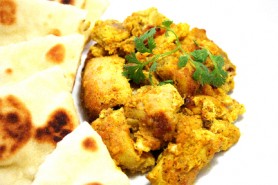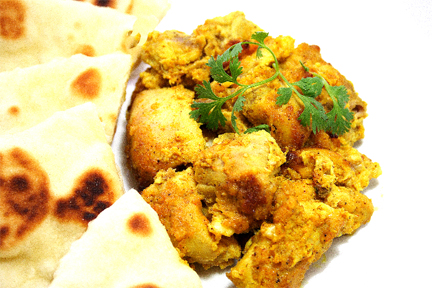Tastes Like Home
Hi Everyone,
It’s Scottish. No, it’s Indian. It’s British. It’s specifically North Indian. It’s… and so the claims of ownership fly to and fro across the continents and the isles. At the heart of this row is a dish called Chicken Tikka Masala.

Chicken Tikka or Murgh Tikka is one of those dishes that travelled and then was adapted to suit the tastes and palates of those in its new home – the United Kingdom. The original dish is more like a kebab, where nuggets of chicken marinated in yogurt and spices are skewered and then cooked in a tandoor oven. The spiced kebabs are served with naan (a type of flat bread). Somewhere along the way, Chicken Tikka or Murgh Tikka became Chicken Tikka Masala. According to a Glasgow chef, Ahmed Aslam Ali, he invented the dish – Chicken Tikka Masala – when one of his customers requested some sauce with the Chicken Tikka because it was a bit dry. And so was born, according to him, Chicken Tikka Masala – nuggets or spiced-marinated chicken made and served in a sauce. These days it is popularly served with rice and naan.
Last week, news broke that there was a battle over who could claim ownership over Chicken Tikka Masala. Scottish Members of Parliament had invoked the wrath of Delhi historians and chefs. These Scottish MPs tabled a motion to have the dish’s origin be officially recognised as Scottish through a Protected Designation of Origin. Protected Designation of Origin is a framework defined in European law to protect the names of regional foods. The purpose of the legislation is to safeguard the reputation of regional foods and eliminate unfair competition and the misleading of consumers by non-genuine products. For example, Parmigiano Reggiano (cheese) of Parma in Italy is protected. Greek Feta Cheese is also under the Protected Designation of Origin. It is made with sheep’s milk and varying amounts of goat’s milk may be added. Feta cheese not labelled Greek may include cow’s milk or be made exclusively from cow’s milk.
Here’s my two-cents.
On the one hand, food travels and as it travels, it will change. Gosh, I am a living example of that. I brought with me ingredients, techniques, methods and recipes that I have adapted to my home here in Barbados. My tastes have adjusted and expanded and continue to grow as I explore the food ways of my new home and those from my travels. At heart, the food for me is now something unique that is made up of my past and my present. I can’t claim it to be strictly Guyanese, Barbadian or even Caribbean. Sure the influences are present and pronounced in some dishes more than others, but the truth is that it’s just my food. It’s food the way I like and make it. In an ideal world, rather than trying to tie down the origin of something we might be acknowledging the creativity of people and we might be saying how wonderful it was that Murgh Tikka in Delhi and Chicken Tikka Masala in Scotland were cousins.
But this is not an ideal world. This desire to hammer down the origins of Chicken Tikka Masala is part of a global trend, and it is less about who created it and more about who can profit from it. Frequently, it seems that the ability to rush and stake a claim has more to do with the wealth of the country from which the claim is being made and the force of its institutions. We have seen similar stories, for example, in the guy who “discovered” Barbados’ Thread snake – a snake Bajans had known for generations – and renamed it. There is the ongoing fight over the rebranding of Basmati rice as Kasmati and Texmati. And not so long ago, Kenyan scientists had to call their British lab partners to task when the British scientists sought an exclusive patent on work they had done together developing an AIDS vaccine.
Developing countries will always be vulnerable to these types of problems. Sometimes it’s because defending international copyrights and patents can be expensive. Sometimes it’s because the very act of copyrighting something can change the relationship to that thing. What was once “our dish” becomes “my dish,” what was once “our snake” (or even just “the snake” an entity to itself happily doing “snakey” things) becomes “my snake” and named after my wife no less, and displayed, as testimony to my brilliance, in the Smithsonian.
It really hurts when amidst one’s battle to survive, there are those whom you warmly welcome as friends who take what you have; what was shared with generosity they claim as their own. They wrap themselves in their privileged cloaks of protection and make the rules as to who can claim, who can make, who can copyright. They decide who in 2009 can make a profit from whatever they “discovered” in our own backyard.
Cynthia
tasteslikehome@gmail.com
www.tasteslikehome.org
For the Murgh/Chicken Tikka Recipe send your request to: tasteslikehome@gmail.com

